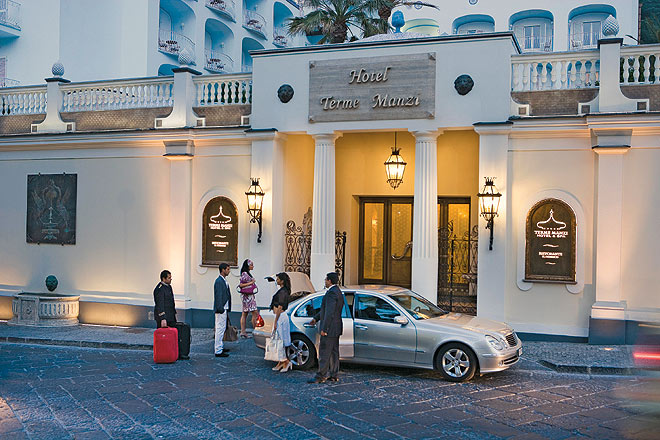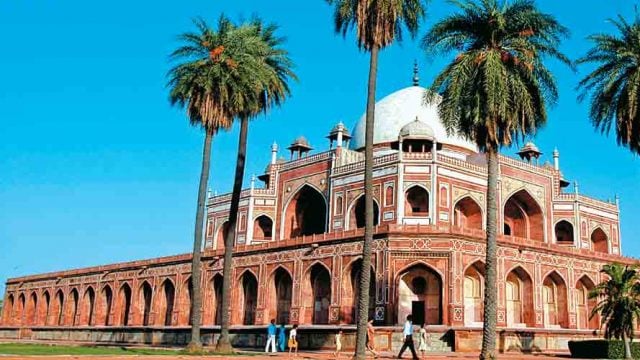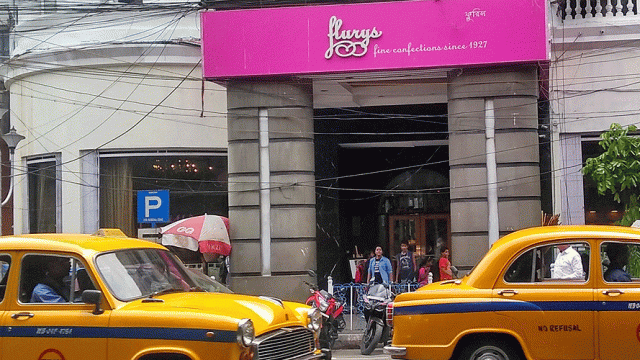I heard about Ischia from an American soprano who knew all of Italy but chose to spend twenty-three ‘quiet’ summers vacationing on that island whose beauty, simplicity and cuisine captivated her. Hearing that it was so near Naples and still ‘undiscovered’, I was intrigued: I had been to Rome and Milan, Florence and Venice, Tuscany and Umbria, lakes Garda and Como and found them all mobbed, even in off-season. This fall, looking for a restful holiday, I was drawn to Ischia. Flying into Rome, I checked into the elegantly neoclassical Hotel Majestic on the Via Veneto. A friend invited me for a drink that evening to the intimate five-star Hotel Eden. Its top-floor bar offers live music and, he promised, “the best 360° views of the Eternal City.” From that clubby watering hole’s deep leather chairs and muted lighting, we gazed upon Rome’s brilliantly lit historic monuments, with ‘the wedding cake building’ and St Peter’s Basilica clearly its highlights. Enchanted, I stayed to linger over a multi-course dinner in La Terrazza dell’Eden, the adjoining Michelin-starred restaurant where chef Fabio Ciervo surprised me, a die-hard vegetarian, with numerous delicacies: a subtle vegetable terrine, a luscious eggplant parmigiana, artichokes braised in wine and olive oil, deep-fried mozzarella stuffed with fresh herbs and tiramisu. This marked an auspicious beginning to the gourmet adventure that I anticipated. The following day, the manager of the Majestic, asking after a common old friend, invited me to lunch. To my delight, he recommended a Sicilian speciality of his chef that was simple—pasta with lemon cream and peppercorn sauce—but scrumptious. Later, as I settled into my plush seat in the Eurostar train for the hour-long journey to Naples, he took me by surprise by rushing over from the hotel to deliver my forgotten passport! Easy friendships and caring warmth are evident everywhere in Italy. At bustling Napoli Centrale, two lovely young women, the owner and the manager of my Ischia hotel, met and accompanied me to the nearby port. From there, we took a hydrofoil to Ischia Porte and then, driving past small coastal villages, we reached the four-star Hotel Garden and Villas Resort near the town of Lacco Ameno. Situated in a lushly landscaped garden, the hotel’s spacious marble-floored villas boast French doors that open on to private terraces with panoramic views. The poolside dining room serves delicious dinners, elaborate breakfast buffets and lunches specialising in fresh organic ingredients from their garden. Being vegetarian posed no problem: Italian chefs everywhere, proudly and imaginatively, served me as many sinful courses as they offered their carnivorous diners. The first on my must-see list was verdant Negombo, a private park built around natural thermal springs that pour into fifteen ‘swimming’ pools that, with their varying temperatures (30-38°C) and minerals, specialise in curative powers for arthritis, rheumatism, skin and circulatory ailments. Serially, I tried several that seemed to help my arthritic knee and bad back. After relaxing on poolside deck chairs and exploring the exclusive San Montano beach that is part of this seaside property, I clambered up to Casa Colonica, Negombo’s rustic trattoria specialising in fried fish, Mediterranean vegetables—deliciously cooked eggplants, peppers, zucchini, tomatoes—and local cheeses including the ‘speciality of the region’, fresh buffalo mozzarella. Ischia’s main tourist attraction, these ubiquitous hot springs deriving from its volcanic subsoil, promise miraculous cures. After four days at Garden Villas, I moved to its sister property, the historic Terme Manzi (terme means thermal, Manzi stands for nineteenth-century hotelier Luigi Manzi), a five-star Relais & Châteaux hotel built over Gurgitiello, the thermal spring whose mineral-rich, radioactive water flows into its modern spa. General Garibaldi came here to heal his 1864 war wounds and was cured; his original bathtub stands at the spa’s entrance. After the Trojan War, Ulysses landed at this ancient Greek colony and was also healed. Centuries later, Dwight Eisenhower vacationed in Ischia. At Terme, I consulted with the spa’s doctor who examined me and recommended hydrotherapy, massage and hot volcanic mudpacks. After a three-day trial package, I felt better—whether from treatment or placebo effect, who can say? What was unquestionable, however, was the Terme’s elegance (paintings and sculptures everywhere), luxury and friendly service. Not surprisingly, Ischia has attracted celebrities galore: actors like Elizabeth Taylor and Richard Burton, Laurence Olivier and Vivien Leigh; poets and writers like W.H. Auden, Truman Capote, Pablo Neruda and Henrik Ibsen; Hollywood beauties such as Gwyneth Paltrow, Grace Kelly and Gina Lollobrigida, even the great Michelangelo himself. They all came in search of peace, privacy and unspoilt beauty. Aristocratic Italian filmmaker Luchino Visconti (The Leopard) bought a leafy hilltop estate here. I made a pilgrimage to that villa, now a museum that celebrates Visconti’s theatrical and cinematic achievements and hosts Ischia’s annual film festival. Afterwards, I dined next door in the five-star Hotel Mezzatorre’s romantic torch-lit terrace, perched on a promontory with magnificent sea and sunset views. The sea is everywhere in Ischia as the island’s main road wraps around the shoreline, dotted with picturesque fishing villages. Fresh seafood is the local speciality, and every corner boasts views of clear blue water on one side, and wooded, emerald-green mountains on the other. Since Ischia’s wines are top rated, I visited a vineyard that grows its grapes on seven hectares of rocky volcanic soil, high up on terraced mountain slopes, then transports them to its downhill wineries on a little private monorail. I got there on a sunny afternoon as Diana, the ‘boss’, finished serving pasta to her eleven harvesters. She chatted with me, in her vineyard kitchen, while tossing a fresh tomato, boiled potato, olive and hot pepper salad with virgin olive oil and basil. We ate it outdoors with crusty bread and delicious house wine. It was the simplest, most memorable meal I ate in Ischia. Diana’s husband was travelling; their two young oenologist daughters were in training. She helps run Casa D’Ambra, her in-laws’ four-generation-old business, founded in 1888. This unpretentious entrepreneur explained the intricacies of their business with understated passion. I learned that Ischia’s Roman name, Aenaria, meant ‘land of vineyards’, that Greek hero Nestor’s priceless cup, excavated near Lacco Ameno, bears an eighth-century BC inscription praising local wine. Later, she handed me a handsome catalogue promoting their eight wines—five million bottles, eighty per cent white, twenty per cent red—all best DOC (Denominazione di Origine Controllata), the coveted official stamp of high quality. As I left, I knew I’d made a lasting connection. That evening, two other new friends—Avril and Beatriz, the Jamaican and Spanish managers of Garden Villas and Terme, respectively—took me to visit the historic Castello Aragonese that towers over a narrow isthmus linking it to the island. A Greek fortress had stood here in 474 BC. Then, King Alfonso of Aragon raised this magnificent symbol of Ischia over the original’s ruins in 1471. Now this privately owned castle offers breathtaking views from its ramparts. Along the way, on the pedestrians-only promenade overflowing with socialising locals, we stopped at boutiques that sold vibrantly colourful handmade pottery. Like art galleries exhibiting local crafts, these shops were unlike those on the neighbouring island of Capri which carry expensive brand-name wares for shopaholic tourists. Ischia has designer boutiques, too, but they are fewer, more discreet, less overwhelming. By contrast, I’d found Capri crowded, commercial and devoid of beaches. Hearing that I write about food, Beatriz introduced me to young Nino di Constanzo, Terme’s 3-Michelin-star-winning chef. I ‘interviewed’ him for fun, he promised to cook for me. So, on my last night, Maria, the thirty-year-old scion of the Polito family, who owns and runs Terme, invited me and her gregarious father Giacomo, to showcase Nino’s talents. After cocktails in the bar, we moved to champagne and appetisers at the Chef’s Table in the state-of-the-art kitchen, then proceeded to the private dining room of Il Mosaico, where the table was set for eight. Once seated, we were offered a ‘water menu’—so many designer brands!—followed by the most stupendous meal I’ve eaten. Bar none. Eleven courses, paired with wines, each one served on a distinctive Murano glass dish, personally designed by Nino, works of art unlike dinnerware anywhere. The food was visually stunning too, colour-coordinated on the plate, reflecting an artist’s palette. The tastes were subtle and surprising, the combinations novel but authentically Ischian. As we ooh’ed and aah’ed over each offering, another succulent one followed. I got special, corresponding vegetarian courses. The five-hour meal concluded with the grandest flourish: a plateful of multi-piece desserts, each one a unique sculptural marvel, a joke-y evocation of Ischia or current affairs, created by Antonino Maresca, the pastry chef, who ran his own separate kitchen that I visited afterwards. The crowning glory of my trip, this dinner transported me beyond imagining. I had arrived in Ischia fresh from sampling two of Paris’s best restaurants, Alain Ducasse at the Plaza Athénée and Jules Verne in the Eiffel Tower. Much as those impressed me, these creative young Ischians blew me away with their artistic originality. GETTING THERE Fly into Rome and break journey for rest, sightseeing, fine-dining. However, there are no direct flights to Rome. The best option from Delhi is on Aeroflot (approx. Rs. 29,098 one way, with a stop in Moscow). Take the one-hour Eurostar train from Rome to Napoli Centrale station. Upon landing, grab another taxi to your hotel. GETTING AROUND ROME ISCHIA WHAT TO SEE & DO ROME ISCHIA







We dined in a little portside restaurant that specialised in the best bruschetta I’ve ever tasted. A meal in itself, this appetiser was a large slice of crisp toast, piled high with the freshest, sweetest ruby-red cherry tomatoes, glistening with garlic and extra-virgin olive oil. Over the week, I’d dined in many small, unpretentious, family-run restaurants, each specialising in local foods: pasta with prawns (to die for, according to my American companions) or clams; pasta with potato or pumpkin; wild mushroom or artichoke risotto; and the favorite of Ischians—rabbit cooked in tomatoes, garlic and wine, cherished at every Sunday lunch. Farm-cultivated rabbits are abundant and “taste like chicken.” The chefs invariably came out to mingle with guests and lap up their compliments. Italian dining, unlike French, is an informal, heartily jovial affair. Lively music is a frequent accompaniment and guests join in spiritedly—singing, dancing, clapping.
In Rome, Hotel Majestic (from € 442; hotelmajestic.com) is centrally located. Five-star hotel with great restaurants.
The spacious four-star Garden & Villas Resort (from € 262; gardenvillasresort.it) is informal and friendly, has an outdoor pool and good food.
Rome has a ‘get on, get off’ double-decker bus tour for sightseeing at your own pace. Buy a one/two-day pass for relaxed bus-hopping. The Majestic has excellent food.
Do not miss Il Mosaico, the Terme’s gourmet restaurant. Spend a morning at Negombo thermal park (negombo.it) and its private San Montano beach. Lunch at its family-run Casa Colonica, a garden trattoria, specialising in delectable vegetables, cheeses and fried fish. Visit the lush Mortello botanical gardens, created by English composer Sir William Walton, and filmmaker Luchino Visconti’s museum. Dine next-door on the torch-lit terrace of the Hotel Mezzatorre with its breathtaking view of sunsets over the ocean. Find colourful local pottery at crafts shops on the no-cars promenade leading to the Aragonese Castle, an iconic sight. Buy local wine—Casa d’Ambra is a quality brand—and sweet limoncello, a lemon liqueur.
Eiffel Tower
Florence
Garden & Villas Resort





